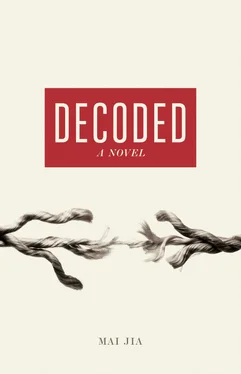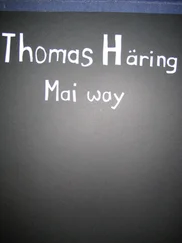Mai Jia - Decoded
Здесь есть возможность читать онлайн «Mai Jia - Decoded» весь текст электронной книги совершенно бесплатно (целиком полную версию без сокращений). В некоторых случаях можно слушать аудио, скачать через торрент в формате fb2 и присутствует краткое содержание. Год выпуска: 2014, Издательство: Allen Lane, Жанр: Современная проза, на английском языке. Описание произведения, (предисловие) а так же отзывы посетителей доступны на портале библиотеки ЛибКат.
- Название:Decoded
- Автор:
- Издательство:Allen Lane
- Жанр:
- Год:2014
- ISBN:нет данных
- Рейтинг книги:3 / 5. Голосов: 1
-
Избранное:Добавить в избранное
- Отзывы:
-
Ваша оценка:
- 60
- 1
- 2
- 3
- 4
- 5
Decoded: краткое содержание, описание и аннотация
Предлагаем к чтению аннотацию, описание, краткое содержание или предисловие (зависит от того, что написал сам автор книги «Decoded»). Если вы не нашли необходимую информацию о книге — напишите в комментариях, мы постараемся отыскать её.
Decoded — читать онлайн бесплатно полную книгу (весь текст) целиком
Ниже представлен текст книги, разбитый по страницам. Система сохранения места последней прочитанной страницы, позволяет с удобством читать онлайн бесплатно книгу «Decoded», без необходимости каждый раз заново искать на чём Вы остановились. Поставьте закладку, и сможете в любой момент перейти на страницу, на которой закончили чтение.
Интервал:
Закладка:
What is a set variation?
A set variation can best be compared to a path beaten through the jungle by many passing feet — on the one hand you can be sure that it is a route that goes from A to B, on the other hand it is also available for anyone to use. You can travel this path, but so can everyone else. Or to take another example: set variations are like conventional weapons. If you are fighting against people who have no weapons at all, your weapons will kill them dead in an instant. On the other hand if your opponent has exactly the same conventional weapons, you may be out there laying mines but he just sends in the minesweepers to clear them up, so you have been wasting your time; you send up your planes but he can see them bright and clear on his radar and he can blow you out of the sky. In those circumstances, you need secret weapons to win on the battlefield. Chess has many secret weapons.
The reason that Liseiwicz was prepared to carry on playing chess with Zhendi was because he realized that he had many secret weapons. He seemed to be able to conjure up an endless series of bizarre and tricky moves, apparently from thin air, giving his opponent the feeling that as he was walking along, someone was tunnelling through the ground beneath his feet. He could really confuse you, because a piece that you thought was dead would — in his hands — suddenly turn out to be crucial for his next move. Zhendi had been playing chess for such a short time, he had so little experience, and he knew so few of the set variations that it was easy to confuse him with your conventional weapons. Or to put it another way, because he did not know any but the most basic set variations, your standard moves were deeply mysterious to him. Of course each of these moves had been used by tens of thousands of people — they are reliable, they have been proved time and time again — so whatever peculiar and tricky move he had thought up was not able to stand up against the tried and tested, and in the end he would lose the game yet again.
Liseiwicz once told me himself that Zhendi was losing not on the basis of intelligence, but on experience, knowledge of the set variations, and playing skill. Liseiwicz said, ‘I have played all sorts of different kinds of chess, starting at the age of four, and over the course of the months and years I got to learn the set variations for each type of game like the back of my hand. Of course it is difficult for Jinzhen to beat me. The fact is that there is no one in my immediate circle who can beat me at chess — I can say without fear of contradiction that at chess, I am a genius. Furthermore, having played for such a long time, I have honed my skills. Unless Zhendi were to spend the next few years concentrating solely on improving his chess-playing abilities, he is never going to be able to beat me. However, when we range our forces against each other, I often feel a refreshing sense of surprise, which I enjoy enormously — that is why I have carried on playing with him.’
That is what he said.
Another game of chess!
And another game of chess!
Because they were playing chess together, Zhendi and Liseiwicz became close friends — they quickly moved beyond the normal teacher — pupil relationship to become really good friends, going out for walks together and eating together. Because they were playing chess, Zhendi spent less and less time at home. Up until then, during the summer and winter holidays, Zhendi would hardly put his nose out of doors — Mummy would often have to practically throw him out of the house in order to get him to spend some time in the fresh air. However, that winter Zhendi was hardly ever at home during the day; to begin with we thought he was playing chess with Liseiwicz but later on we found out that this was not the case. They weren’t playing chess — they were developing a new kind of board game.
I am sure that you will find it difficult to believe they were inventing their own variant of chess — Zhendi called it ‘mathematical chess’. Later on, I got to see them play on many occasions and it was really weird — the board was about the same size as a desktop, and there were two military encampments on it — one was a kind of hatch # shape, the other the shape of a Coptic cross. They played this game with mahjong tiles rather than chess pieces. There were four routes across the board and each player held two of them, stretching out from the hatch and the Coptic cross encampments. The pieces that started in the hatch encampment had a set arrangement, somewhat like that seen in elephant chess, where each piece has a particular starting position, but the pieces in the Coptic cross encampment could begin in any position — the arrangement was determined by your opponent. When your opponent arranged your pieces, he was of course thinking entirely of his own plan of campaign, placing them in the most favourable positions for his own purposes. Once the game began, you took over control of these pieces and it was up to you to move them. Naturally, your priority was to move these pieces from a position advantageous to the enemy to one favourable to yourself at the earliest possible opportunity. During the course of a game, a piece could move between the hatch and the Coptic cross encampments, and in principle, the fewer impediments you faced in advancing your pieces into the enemy encampment, the greater your chances of victory. However, the rules governing the circumstances in which you could simultaneously move a piece into the opposition camp were very strict and needed careful planning and preparation. Furthermore, once a piece had entered the enemy encampment, the way in which it could move changed. The biggest difference in the types of movement possible was that pieces in the hatch encampment could not move on the diagonal nor could they jump over other pieces. Both of these types of moves were allowed in the Coptic cross encampment. Compared to standard chess, the biggest difference was that when you were playing, you had to be thinking about how you would advance your own pieces along the two routes under your control: making sure that you had them arranged for the moves you intended to carry out, while at the same time making sure that at the earliest possible moment the disadvantageous pieces were moved into better positions and that when the time came, both you and your opponent could simultaneously move a piece into the enemy camp. You could say that you were playing chess against your opponent, but also against yourself — it felt as though you were playing against two different opponents at one and the same time. It was one game, but it was also three, for each of the two players had the game going on against themselves, as well as the one against their opponent.
It was a very complicated, strange game. The best comparison I can think of is to say that it is like the two of us joining battle, only to discover that my troops are under your command and your troops are under my command. Just think how bizarre and complicated it would be to fight a battle with only the opposing army at your command — bizarreness can in some cases be a kind of complexity. Because this game was so very complicated, most people simply could not play it. Liseiwicz said that it was designed solely for mathematicians to play and that is why it was called mathematical chess. There was one occasion when Liseiwicz was chatting to me about this game and he said triumphantly: ‘This game is the result of much research into pure mathematics: given the level of mathematical knowledge required to deal with its complexities, not to mention its intricate rules, the subtle way in which the subjective role of the player transforms the structural organization — really only human intelligence can compare. Inventing this chess game was a way of challenging the limits of our intelligence.’
Читать дальшеИнтервал:
Закладка:
Похожие книги на «Decoded»
Представляем Вашему вниманию похожие книги на «Decoded» списком для выбора. Мы отобрали схожую по названию и смыслу литературу в надежде предоставить читателям больше вариантов отыскать новые, интересные, ещё непрочитанные произведения.
Обсуждение, отзывы о книге «Decoded» и просто собственные мнения читателей. Оставьте ваши комментарии, напишите, что Вы думаете о произведении, его смысле или главных героях. Укажите что конкретно понравилось, а что нет, и почему Вы так считаете.












